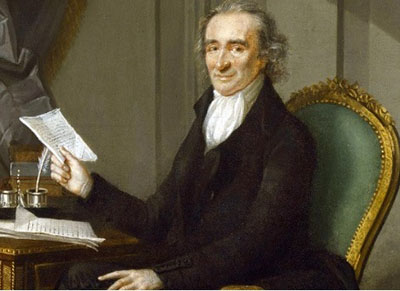by WorldTribune Staff, April 4, 2023
[The following excerpts are from Thomas Paine’s Common Sense. Originally published in 1776, which lays out Paine’s theory for why the American colonies should declareindependence.]
Why should we think that some people are born to be rulers and some born to be subjects? “[T]here is another and greater distinction for which no truly natural or religious reason can be assigned, and that is the distinction of men into KINGS and SUBJECTS. Male and female are the distinctions of nature, good and bad the distinctions of Heaven; but how a race of men came into the world so exalted above the rest, and distinguished like some new species, is worth inquiring into, and whether they are the means of happiness or of misery to mankind.
The divine right of kings is a lie; monarchy runs against God’s plans. These portions of scripture are direct and positive. They admit of no equivocal construction. That the Almighty hath here entered his protest against monarchical government is true, or the scripture is false. . .
 Think for yourself, and follow common sense. . . .
Think for yourself, and follow common sense. . . .
… We ought to reflect, that there are three different ways by which an independancy may hereafter be effected; and that one of those three, will, one day or other, be the fate of America, viz. By the legal voice of the people in Congress; by a military power; or by a mob: It may not always happen that our soldiers are citizens, and the multitude a body of reasonable men; virtue, as I have already remarked, is not hereditary, neither is it perpetual.
Should an independancy be brought about by the first of those means, we have every opportunity and every encouragement before us, to form the noblest, purest constitution on the face of the earth. We have it in our power to begin the world over again. A situation, similar to the present, hath not happened since the days of Noah until now. The birthday of a new world is at hand, and a race of men, perhaps as numerous as all Europe contains, are to receive their portion of freedom from the events of a few months. The reflection is awful, and in this point of view, how trifling, how ridiculous, do the little paltry cavilings of a few weak or interested men appear, when weighed against the business of a world.
Let’s unite on behalf of America and win our independence. WHEREFORE, instead of gazing at each other with suspicious or doubtful curiosity, let each of us hold out to his neighbor the hearty hand of friendship, and unite in drawing a line, which, like an act of oblivion, shall bury in forgetfulness every former dissention. Let the names of Whig and Tory be extinct; and let none other be heard among us, than those of a good citizen; an open and resolute friend; and a virtuous supporter of the RIGHTS of MANKIND, and of the FREE AND INDEPENDANT STATES OF AMERICA. . . .
In America, the rule of law is king. But where says some is the King of America? I’ll tell you Friend, he reigns above, and doth not make havoc of mankind like the Royal Brute of Britain. Yet that we may not appear to be defective even in earthly honors, let a day be solemnly set apart for proclaiming the charter; let it be brought forth placed on the divine law, the word of God; let a crown be placed thereon, by which the world may know, that so far as we approve of monarchy, that in America the law is king. For as in absolute governments the King is law, so in free countries the law ought to be King; and there ought to be no other. But lest any ill use should afterwards arise, let the crown at the conclusion of the ceremony be demolished, and scattered among the people whose right it is. . . .
We must seize this opportunity to create a government of our own based on the right principles. The present time, likewise, is that peculiar time, which never happens to a nation but once, viz. the time of forming itself into a government. Most nations have let slip the opportunity, and by that means have been compelled to receive laws from their conquerors, instead of making laws for themselves. First, they had a king, and then a form of government; whereas, the articles or charter of government, should be formed first, and men delegated to execute them afterward: but from the errors of other nations, let us learn wisdom, and lay hold of the present opportunity—To begin government at the right end.
Action . . . . Intelligence . . . . Publish
